Related Research Articles

The Schutzstaffel was a major paramilitary organization under Adolf Hitler and the Nazi Party in Nazi Germany, and later throughout German-occupied Europe during World War II. It began with a small guard unit known as the Saal-Schutz made up of party volunteers to provide security for party meetings in Munich. In 1925, Heinrich Himmler joined the unit, which had by then been reformed and given its final name. Under his direction (1929–1945) it grew from a small paramilitary formation during the Weimar Republic to one of the most powerful organizations in Nazi Germany. From the time of the Nazi Party's rise to power until the regime's collapse in 1945, the SS was the foremost agency of security, surveillance, and terror within Germany and German-occupied Europe.

The British Free Corps was a unit of the Waffen-SS of Nazi Germany during World War II, made up of British and Dominion prisoners of war who had been recruited by Germany. The unit was originally known as the Legion of St George. Research by British historian Adrian Weale has identified 54 men who belonged to this unit at one time or another, some for only a few days. At no time did it reach more than 27 men in strength.

Australia joined a US-led coalition in its 2003 Iraq invasion, widely viewed as illegal under international law. Declassified documents reveal that the decision to go to war was taken primarily with a view to enhancing its alliance with the United States.

Josef "Sepp" Dietrich was a German politician and SS commander during the Nazi era. He joined the Nazi Party in 1928 and was elected to the Reichstag of the Weimar Republic in 1930. Prior to 1929, Dietrich was Adolf Hitler's chauffeur and bodyguard.

John Amery was a British fascist and Nazi collaborator during World War II. He was the originator of the British Free Corps, a volunteer Waffen-SS unit composed of former British and Dominion prisoners-of-war.
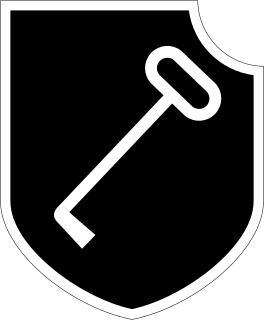
The 1st SS Panzer Division Leibstandarte SS Adolf Hitler or SS Division Leibstandarte, abbreviated as LSSAH, (German: 1. SS-Panzerdivision "Leibstandarte SS Adolf Hitler") began as Adolf Hitler's personal bodyguard, responsible for guarding the Führer's person, offices, and residences. Initially the size of a regiment, the LSSAH eventually grew into an elite division-sized unit during World War II.
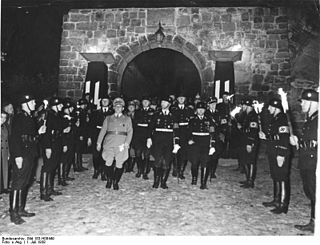
The Allgemeine SS was a major branch of the Schutzstaffel (SS) paramilitary forces of Nazi Germany; it was managed by the SS Main Office (SS-Hauptamt). The Allgemeine SS was officially established in the autumn of 1934 to distinguish its members from the SS-Verfügungstruppe, which later became the Waffen-SS, and the SS-Totenkopfverbände, which were in charge of the Nazi concentration camps and extermination camps. SS formations committed many war crimes against civilians and allied servicemen.
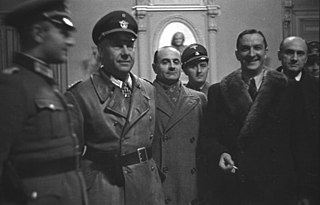
The Sicherheitspolizei, often abbreviated as SiPo, was a term used in Germany for security police. In the Nazi era, it was used to describe the state political and criminal investigation security agencies. It was made up by the combined forces of the Gestapo and the Kriminalpolizei between 1936 and 1939. As a formal agency, the SiPo was incorporated into the Reich Security Main Office (RSHA) in 1939, but the term continued to be used informally until the end of World War II in Europe.

Julius Schreck was an early senior Nazi official and close confidant of Adolf Hitler.
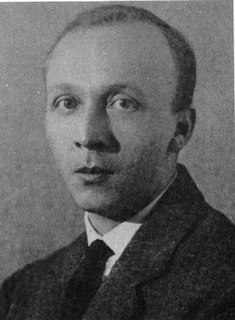
Erhard Heiden was an early member of the Nazi Party and the third commander of the Schutzstaffel (SS), the paramilitary wing of the Sturmabteilung. He was appointed head of the SS, an elite subsection of the SA in 1927. At that time the SS numbered less than a thousand men and Heiden found it difficult to cope under the much larger SA. Heiden was not a success in the post, and SS membership dropped significantly under his leadership. He was dismissed from his post in 1929, officially for "family reasons". He was arrested after the Nazis came to power in 1933 and executed that same year.
John Henry Owen Brown DCM was a Quartermaster Sergeant in the Royal Artillery in the British Army, who served in France at the beginning of the Second World War. He was one of Britain's most successful espionage agents as a prisoner of war following his capture by German forces, and, following the war's conclusion, acted as a prosecution witness in trials for treason.

Reginald Eric Pleasants was a British national who joined the Waffen-SS serving in the British Free Corps during the Second World War.
Operation Bajadere is a disputed special forces operation of World War II.
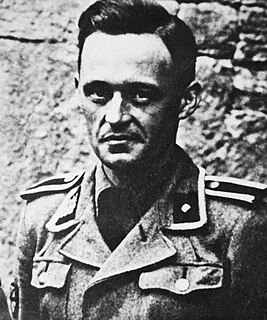
Roy Nicolas Courlander,, nicknamed 'Reg', was a British-born New Zealand soldier who became an Unterscharführer in the German Waffen-SS British Free Corps during the Second World War.
Thomas Haller Cooper,, also known as Tom Böttcher, was a member of the German Waffen-SS British Free Corps and former member of the British Union of Fascists.

George Frank McLardy MPS was a member of the British Union of Fascists, a British Nazi collaborator and an Unterscharführer in the Waffen-SS British Free Corps during the Second World War.
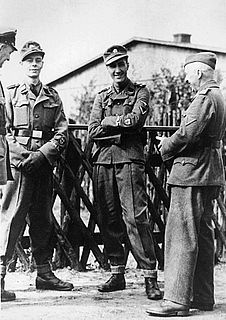
Kenneth Edward Jordan Berry was a British seaman who was taken as a prisoner of war in 1940 when his ship was sunk. While in prison camp he was persuaded to join the British Free Corps of the Waffen-SS as an SS-Mann during the Second World War. He was associated with the unit until 29 April 1945, when he could not be found when the Corps were leaving Neustrelitz, and was left behind. He received a nine-month sentence after the war, 'the lightest sentence passed on any traitor'.
References
- ↑ "Weale, Adrian". WorldCat Identities. Retrieved 6 May 2010.
- ↑ "Adrian Weale biography". Andrew Lownie Literary Agency. Retrieved 6 May 2010.
- ↑ Weale, The SS: A New History, 2010.
- ↑ "About Adrian Weale". H. M. Forces.co.uk. Archived from the original on 2 March 2009. Retrieved 6 May 2010.
- ↑ Jack Fairweather, A War of Choice, Jonathan Cape 2011, p. 93-94
- ↑ "BAFF's Executive Council". British Armed Forces Federation. Archived from the original on 27 February 2010. Retrieved 6 May 2010.
- ↑ http://news.bbc.co.uk/1/hi/events/newsnight/1660604.stm